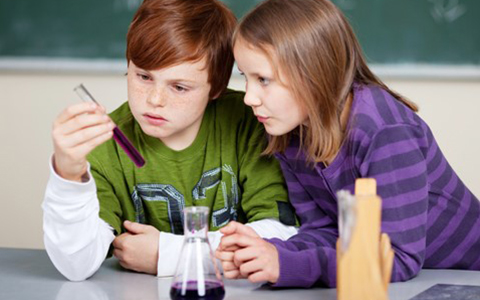Background
Project: S-TEAM
Improving science teaching and encouraging more young people into the sciences have been key government objectives in Europe for years. The European Union (EU) funded S-TEAM project tackled the issue by looking at the teaching side of the equation. Completed in 2012, it was one of the first EU research projects to focus on Inquiry-Based Science Teaching (IBST) as a method of improving take-up in the sciences.

IBST as a concept has been around since the 1960s. The idea is that an individual’s developing knowledge of a subject is driven by curiosity rather than passively absorbing information. The student takes an interest in the subject by asking questions or coming up with answers to set problems, thus becoming an active participant in the learning process.
S-TEAM researchers developed this concept with the help of a large number of universities and teaching institutions across Europe. For this reason the partners did not want to take a prescriptive approach. “We had to allow for significant cultural differences in the teaching process,” says project manager Peter Gray. “So we focused on developing tools and working with our partners to apply those tools to their own teaching methodologies,” he adds.
A wide range of materials were developed in the project, from tools for use in the classroom to explanatory leaflets for parents. One example is “Wheels on Fire”, a practical guide for teachers from the Norwegian University of Science and Technology, which describes a cross-curricular project on design and technology at Ruseløkka school in Oslo.
The project revolved around learning by self-driven inquiry and problem solving in designing and making a model car with an electric motor. The Wheels on Fire booklet and video provide ideas on how such an extensive project can be undertaken, including organisation, pedagogy and equipment, as well as how different school subjects could contribute and how to assess the learning outcome.
S-TEAM’s work also involved training teachers in the use of such materials. A course would typically involve teachers from one school or group of schools over a single school term. After the initial workshop the teachers would go back and prepare their own materials, then return and compare them to the approaches taken by others.
“The point of this approach was to develop ways in which teachers would create their own inquiry-based teaching practices without external involvement,” says Gray. “It was a way of embedding those practices so that teachers would go on to spread their ideas with fellow professionals after the workshops were over,” he explains.
According to Gray, the project results are “very positive.” All new science teachers graduating from participating institutions between 2009 and 2012 were informed about S-TEAM, and were able to access information on IBST from the project website or a national education portal. In Norway one teacher-education initiative – the SUN project – has taken off fast as a result of the project. The project was Europe-wide however, and teachers from Galicia to Cyprus have also been disseminating what they have learnt.
After the S-TEAM project ended, the partners joined an informal group of coordinators, ProCoNet, which aims to enhance the development of STEM (Science, Technology, Engineering and Mathematics) education and to incorporate that learning into possible future projects. At the same time, another EU-funded project, INSTEM, is pooling a synthesis of the learning captured from other projects, and developing recommendations on how to make the best use of that knowledge.
S-TEAM has also been incorporated into Scientix (www.scientix.eu), a fully searchable database of current and past projects in STEM education, both European and national. Scientix (The Community for Science Education in Europe) promotes and supports Europe-wide collaboration among STEM teachers, education researchers, policymakers and other STEM education professionals, and it is financed under the EU’s Seventh Research Framework Programme (FP7).
“We have stopped seeing ourselves as an isolated bubble in one European research project,” says Gray, “we are part of a whole EU movement towards more inquiry-based science teaching.” The S-TEAM project is believed to have reached around 5,000 teachers directly, and potentially even more with the diffusion of inquiry-based methods into national education systems.
This innovation was made possible by Israel’s continued participation in the official Horizon 2020 fund, managed in Israel by ISERD part of The Israel Innovation Authority (Formerly the Office of the Chief Scientist and MATIMOP). The initiative has taken Israeli R&D to the next level with the help of ground-breaking collaboration between scientists in Israel and Europe, as well as essential funding and support.
Project details
Project acronym: S-TEAM
Participants: Norway (Coordinator),UK, Sweden, Germany, Finland, Spain, Latvia, Estonia, Israel, Denmark, Cyprus, France, Turkey, Czech Republic
FP7 Proj. N° 234870
Total costs: € 5 240 157
EU contribution: € 4 699 928
Duration: May 2009 – April 2012
